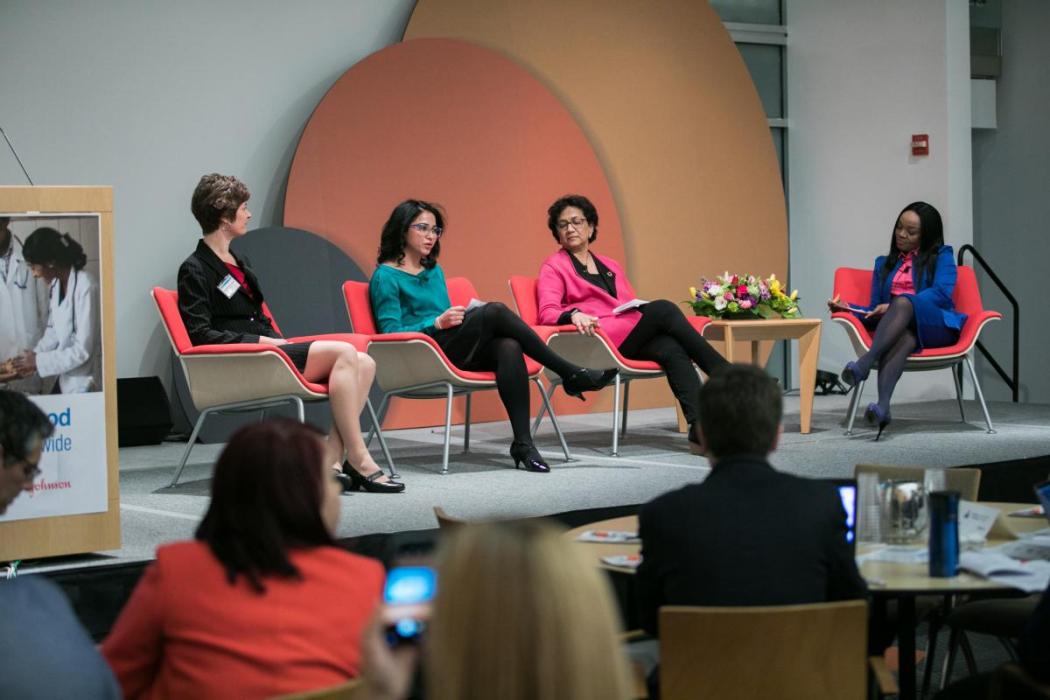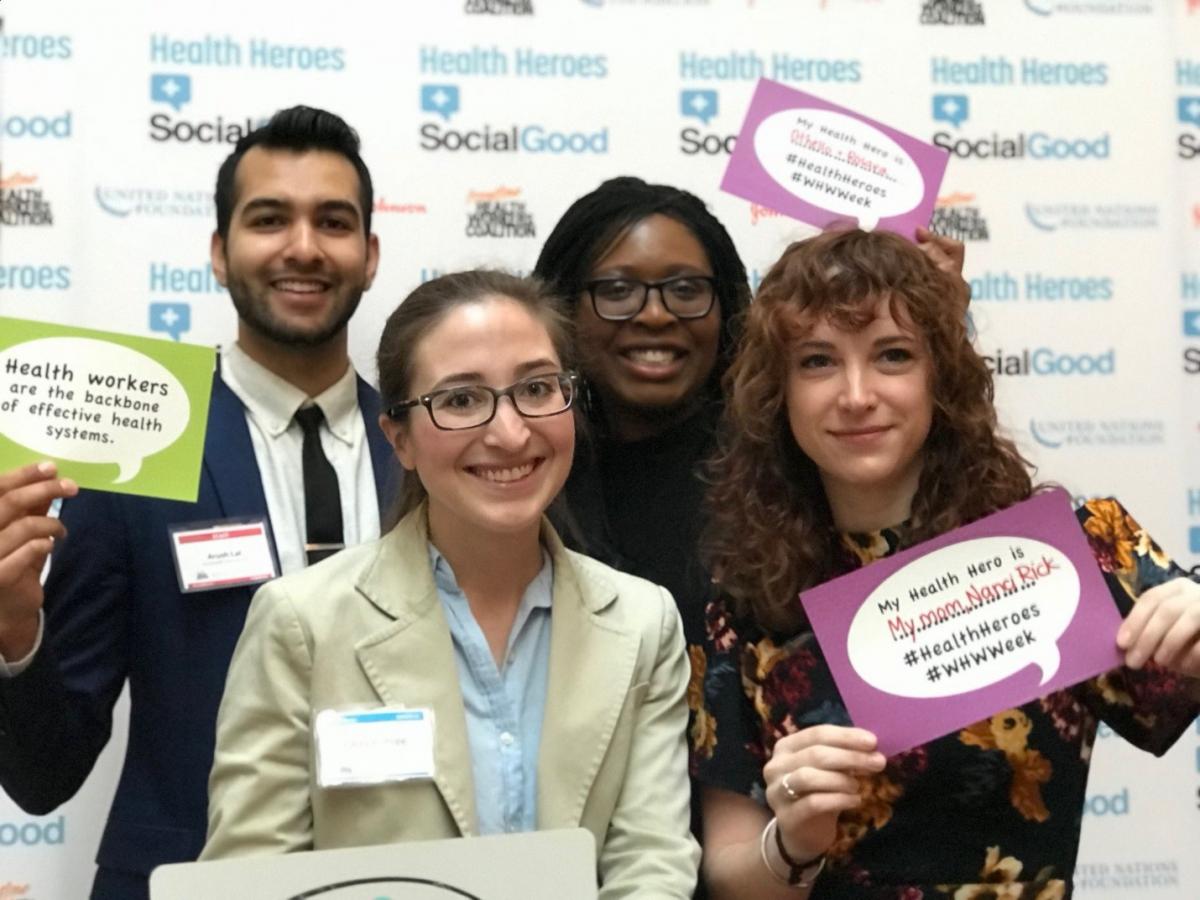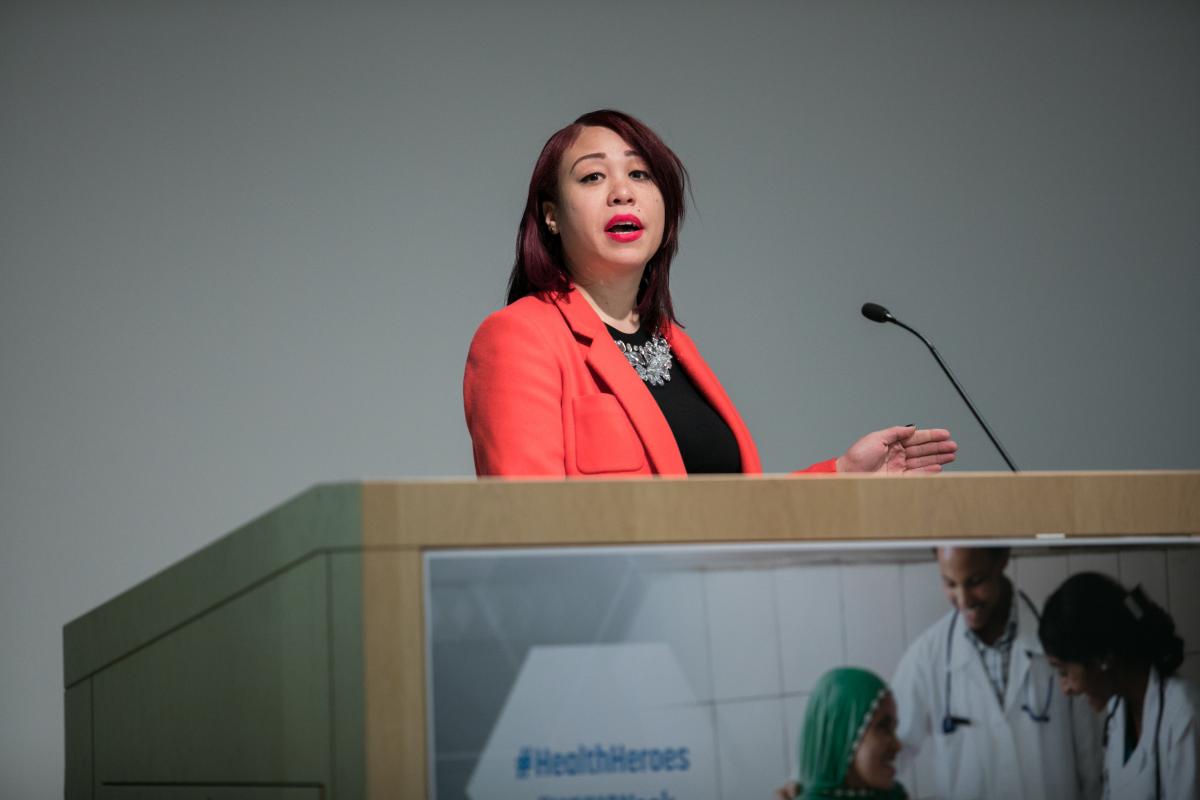More than a story: takeaways from the Health Heroes Plus Social Good Summit

Linord Moudou, Geeta Rao Gupta, Dr. Roopa Dhatt, and Julia Bluestone speak on a panel addressing Women in the Health Workforce. Courtesy Amy Fletcher.
By Temi Omilabu, IntraHealth International and the Frontline Health Workers Coalition
As global health policymakers from around the world this week are discussing the financing needed to achieve universal health coverage on the sidelines of the World Bank spring meetings here in Washington – they would be wise to heed the stories and calls for investment and inclusion by the frontline health workers who spoke at the Health Heroes + Social Good Summit on April 5 during World Health Worker Week.

Members of IntraHealth International’s Frontline Health Workers Coalition secretariat team at the Health Heroes + Social Good Summit. Courtesy Johnson and Johnson.
Plus Social Good, the Frontline Health Workers Coalition, Johnson and Johnson, and the United Nations Foundation, hosted the inaugural “Health Heroes + Social Good” Summit to call attention to some of the most acute policy issues facing the global health workforce including gender equity issues in the workforce, global health security, deliberate attacks on health workers in conflict settings, and ensuring the investment in health workers needed to achieve the Sustainable Development Goals, including universal health coverage.
Frontline health workers from around the world – from a Liberian mental health nurse, to a community health worker in the Bronx, to the sister of the lone health worker who died of Ebola in Nigeria after preventing countless infections – were present to share their stories and inspire action. Global health policy experts backstopped their stories in thought-provoking conversations about challenges and innovative solutions in the health workforce.
However, following the inspiring and constructive summit, one question remains: What now?
What do we do with the lessons we learned, and how do we act on the inspiring stories we heard?
Women in the Health Workforce/ Achieving the SDGs

Rosaura de Jesus, a community health worker in the Bronx. Courtesy Amy Fletcher.
“Our work is more than helping people improve their health. It’s about helping them restore their dignity.”
Rosaura de Jesus’ story delivered a rallying cry for advocating for the health, safety, and well-being of women health workers and the communities they serve. Rosaura told stories about her work in a predominantly Dominican area of the Bronx, New York City, where she often witnesses women being “discarded” by the communities they belong to. In her role as a community health worker, she aims to restore dignity to the women our society tends to disregard.
Rosaura’s story reminds us of the pressing need to make gender equality a reality in today’s health workforce.
In low- and middle- income countries, 70% of health workers are women, yet most of the specialized and leadership positions are held by men. Yet, if women could participate in the economy equally, there would be a $28 trillion increase in the global GDP.
Relatedly, when discussing potential approaches to other health workforce development challenges, Dr. Alaa Murabit, of the UN High-Level Commission on Health Employment and Economic Growth, left the crowd with something to think about: “Education and health are the most cost-effective solutions to climate change globally,” she said.
To build and sustain the workforce, and to achieve gender equality, we need to recognize the intersectionality of the SDGs, and the role women frontline health workers play in achieving them.
If we invest in frontline health workers like Rosaura, we are also investing in education, eradicating poverty, tackling hunger, addressing gender equality, and promoting clean water and sanitation. Gender equality is vital in achieving not only a robust health workforce, but in achieving the SDGs.
Moving forward, we must encourage our governments to create and implement multi-stakeholder financing plans to invest in the health employment of women. Such plans should align with the Global Workforce 2030 Strategy and the ILO-WHO-OECD Working for Health Action Plan 2017-2021. After all, when a woman is given the opportunity to thrive, the whole community thrives alongside her, and we take another step towards achieving the SDGs.
Global Health Security/Conflict and Disaster Settings

Othello Carrjallah, Liberian mental health nurse. Courtesy Amy Fletcher.
“Ebola not only killed our people – it also exposed major weaknesses in Liberia’s health system…. health workers were the difference between life and death.”
Othello Carrjallah was on the frontlines of the 2014 Ebola crisis in Liberia. At the time of the outbreak, the entire country had 50 medical doctors for a population of 4.3 million people – for context, Othello explained that there was one trained medical doctor for every 86,000 people. Compared to the 50 medical doctors, there were approximately 7,000 health workers in Liberia at the time.
A lack of resources and adequately trained medical professionals made Liberia vulnerable to Ebola. It was the frontline health workers who stepped in when the broken system could not protect its people.
We often recognize that frontline health workers are central in protecting us from pandemics. So, it makes sense that the countries hit hardest by Ebola all had the lowest ratios of health workers per population. Bipartisan House Resolution 342, “Recognizing the essential contributions of frontline health workers to strengthening the United States national security and economic prosperity, sustaining and expanding progress on global health, and saving the lives of millions of women, men, and children around the world,” enunciates that a resilient health workforce is essential in achieving global health security. By encouraging members of congress to co-sponsor and urge passage of the resolution – led by Reps. Nita Lowey (D-NY) and Mario Diaz-Balart (R-Fla.) – we can take a step towards ensuring global health security all over the globe.
Othello’s story is a poignant reminder that health workers are more than an investment for global health security.
They are the difference between life and death for millions worldwide.
Looking Forward

Vince Blaser, Director of the Frontline Health Workers Coalition. Courtesy Amy Fletcher.
Frontline Health Workers Coalition Director Vince Blaser closed the summit with a reminder that the complexity of global health issues often leads to inaction. However, if we want to ensure the SDGs and universal health coverage, we must raise health workers to a higher level in the global health policy discourse. Looking forward, we must demand action and accountability for health workers in every global health policy and initiative.
Finally, we must hear their stories and act on them. Following the Health Heroes Plus Social Good Summit, we must commit, as a global health and development community, to elevate health worker stories to create effective policy change.
